Brazil, South America’s largest country, spans 8.5 million square kilometers of breathtaking landscapes. From bustling financial centers to serene coastal towns, this diverse nation offers something for everyone. With a growing economy and a life expectancy of 76 years, it’s no surprise that over 1.3 million immigrants call it home.
Whether you’re drawn to cultural hotspots or economic opportunities, Brazil’s urban hubs cater to varied lifestyles. Expat communities thrive here, blending influences from Japan, Italy, Bolivia, and Argentina. The country’s lower cost of living compared to the U.S. makes it an appealing choice for relocation.
This guide highlights key destinations where quality of life meets adventure. Get ready to explore dynamic neighborhoods, stunning beaches, and thriving business districts—all wrapped in Brazil’s infectious energy.
Key Takeaways
- Brazil is South America’s largest country with diverse landscapes and urban centers.
- The population enjoys a life expectancy of 76 years, supported by strong healthcare.
- Over 1.3 million immigrants contribute to vibrant multicultural communities.
- Major hubs offer financial opportunities, coastal living, and rich cultural experiences.
- The cost of living is lower than in the U.S., attracting expats and digital nomads.
Why Brazil Is a Great Place to Call Home
With 212 million residents and 1.3 million immigrants, Brazil thrives as a multicultural hub. Its welcoming people blend traditions from Europe, Africa, and indigenous communities, creating a lively culture celebrated worldwide.
Enjoy year-round warmth—temperatures rarely dip below 68°F (20°C). Whether you love beachside cafés or urban festivals, the climate supports an active, outdoor lifestyle.
Brazil prioritizes quality life with universal healthcare (SUS) and an average monthly salary of $1,596. The 87.6% COVID vaccination rate reflects robust public health efforts.
Families thrive here thanks to tight-knit communities and affordable living. Helpers earn around $200 monthly, freeing time to explore Brazil’s natural world of jungles and coastlines.
Tech, energy, and tourism sectors are booming, offering jobs for expats. Combine career growth with vibrant street parties and UNESCO-recognized cuisine—it’s easy to feel at home.
What Makes a City Ideal for Living in Brazil
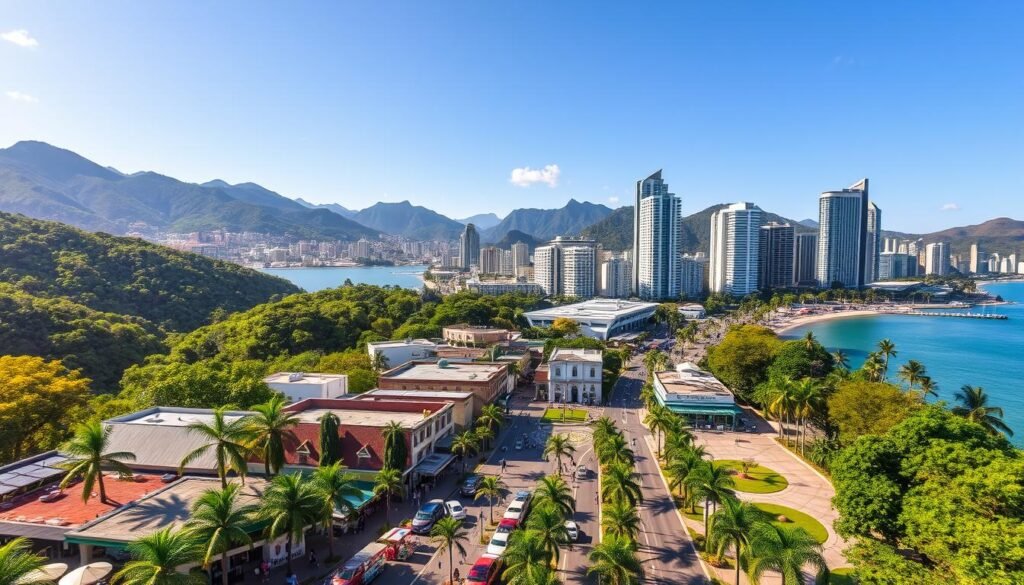
Finding the perfect urban hub depends on key lifestyle factors. From affordable housing to reliable healthcare, Brazil’s top destinations balance modern comforts with cultural charm.
Housing costs are 73% lower than in the UK, with rents as low as $500 in coastal towns like João Pessoa. Groceries add to savings—think $1.50 for milk or $2 for chicken.
Over half of expats choose private healthcare, though public options exist. Cities like Curitiba boast efficient hospitals, while São Paulo offers world-class specialists.
For families, education matters. International schools thrive in Rio and Florianópolis, and 69% of teens enroll in secondary programs nationwide.
| City | Avg. Rent (1BR) | Safety Rating | Public Transport |
|---|---|---|---|
| Florianópolis | $600 | High | Good |
| Rio de Janeiro | $800 | Moderate* | Excellent |
| Curitiba | $550 | High | Best in Brazil |
*Safe neighborhoods like Barra da Tijuca offset tourist-area risks.
Easy access to nature elevates daily life. Walk to beaches in Natal or hike jungles near Belém. Reliable buses and metros connect you to work and play.
Prioritize low-crime zones—Florianópolis and Porto Alegre rank highest for safety. With smart planning, you’ll enjoy Brazil’s vibrancy without compromise.
Best Cities to Live in Brazil
Brazil’s most famous metros blend economic power with cultural richness. Whether you seek corporate careers or coastal vibes, two destinations dominate the conversation.
São Paulo: The Financial Powerhouse
Home to 12 million people, São Paulo drives 34% of the nation’s GDP. Skyscrapers in Jardins house global firms, while Vila Madalena’s street art fuels a bohemian nightlife.
Tech thrives here—Paulista Avenue hosts startups and Fortune 500 giants. Though social inclusion scores lag, the job market thrives in finance and international trade.
Rio de Janeiro: Beaches and Vibrant Culture
Rio de Janeiro dazzles with Carnival parades and postcard-perfect views from Sugarloaf Mountain. Average rents hit $972 in prime zones, but Ipanema’s safety outshines Copacabana.
English fluency rises in corporate sectors, easing transitions for expats. Despite SPI rankings citing climate risks, the energy of samba and sunset beaches never fades.
Salvador: A Blend of History and Coastal Charm
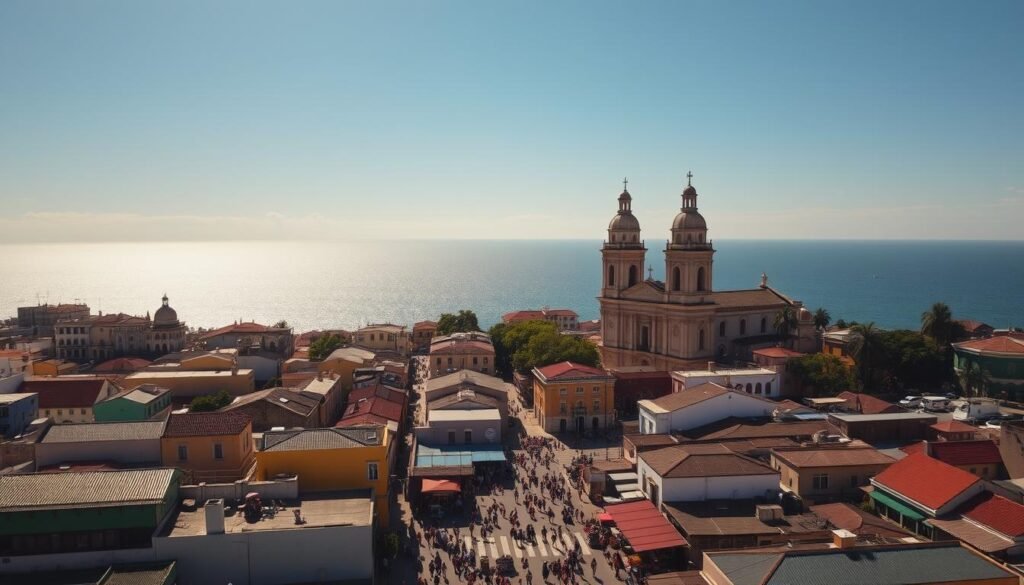
Founded in 1549, Salvador blends UNESCO World Heritage history with vibrant coastal energy. As Brazil’s first capital, its Pelourinho district dazzles with 96 painted colonial buildings. The average living cost of $825/month makes it a top choice among places live Brazil for culture lovers.
The Cultural Heart: Pelourinho
Pelourinho’s cobblestone streets echo 500 years of Afro-Brazilian heritage. Capoeira circles form near São Francisco Church, where dancers move to berimbau rhythms. Don’t miss the Carnival—this city’s version draws 4 million revelers annually.
Rio Vermelho: Where the City Comes Alive
By night, Rio Vermelho pulses with live music at Casa do Rio Vermelho. Beachfront areas like Barra offer apartments with ocean views. A tight-knit expat community thrives here, aided by Portuguese language schools.
“Salvador is where Africa meets Brazil—every meal, drumbeat, and festival tells that story.”
From capoeira schools to moqueca seafood feasts, Salvador immerses you in living traditions. Its genetic mosaic—51% African, 43% European—creates a culture unlike anywhere else.
Florianópolis: The Island of Magic
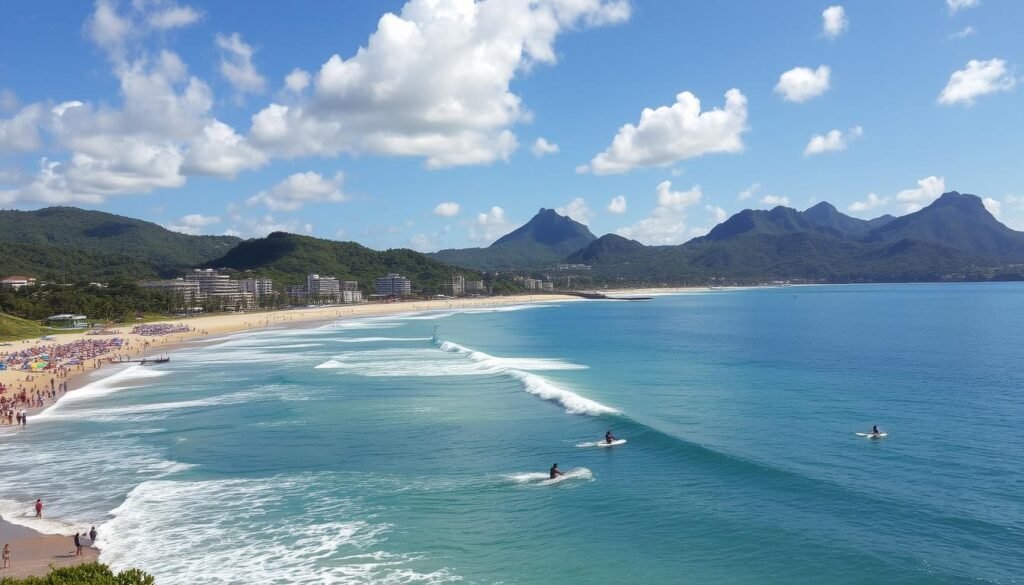
Florianópolis dazzles with 60+ beaches along its 54km coastline. This region balances tech innovation and nature, where 230+ startups thrive near surf breaks. Locals call it “The Island of Magic” for its relaxed vibe and stunning landscapes.
Pristine Beaches and Outdoor Adventures
Joaquina Beach draws surfers with consistent waves, while Praia Mole’s golden cliffs create a photogenic backdrop. For land lovers, Lagoa da Conceição offers hiking trails with panoramic lagoon views.
Adrenaline seekers flock here for:
- Sandboarding on dunes near Campeche
- Kayaking through mangroves at Ratones
- Rock climbing at Costa da Lagoa
UNESCO City of Gastronomy
In 2024, Florianópolis earned the UNESCO City of Gastronomy title. Mercado Público serves fresh oysters, while Arabic eateries dish up kibbeh. Don’t miss açai bowls topped with granola—a local tradition.
Co-working spaces like Selina save you time with ocean-view desks. After work, join sunset drum circles at Barra da Lagoa—easy access to culture and community.
Brasilia: The Futuristic Capital
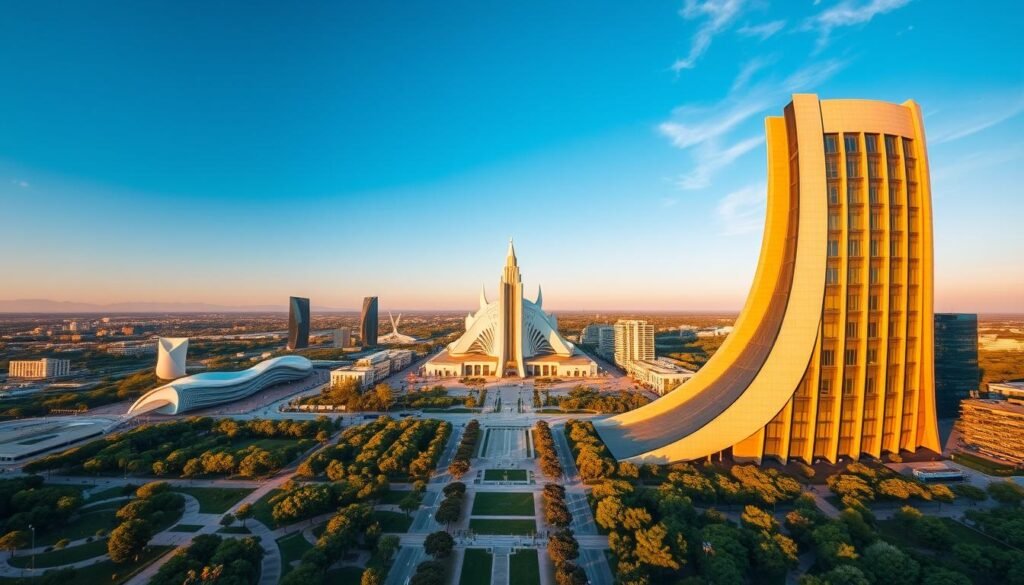
Designed like a soaring airplane, Brasilia redefines urban planning with its bold vision. Inaugurated in 1960, this capital boasts Oscar Niemeyer’s iconic buildings—from the Cathedral’s stained-glass halo to the National Congress’ twin towers. Its 58.8 SPI wellbeing score reflects top-tier public services.
Professionals thrive here. Government roles dominate, but 124 embassies create diplomatic opportunities. International schools in Asa Sul cater to expat families, while Parque da Cidade—one of the world’s largest urban parks—offers 420 hectares of trails.
Culture shines through Niemeyer’s concrete curves and the Banco do Brasil’s art exhibitions. Foodies enjoy the growing vegan scene, like Org Bistrô’s jackfruit feijoada. Every sector, from Hotel to Banking, follows the city’s visionary grid.
“Brasilia isn’t just a city—it’s a manifesto of what modern living can be.”
With Paranoá Lake’s watersports and Lúcio Costa’s airplane layout, this UNESCO site merges function with artistry. For professionals seeking order and inspiration, Brasilia delivers both.
Curitiba: The Greenest City in Brazil
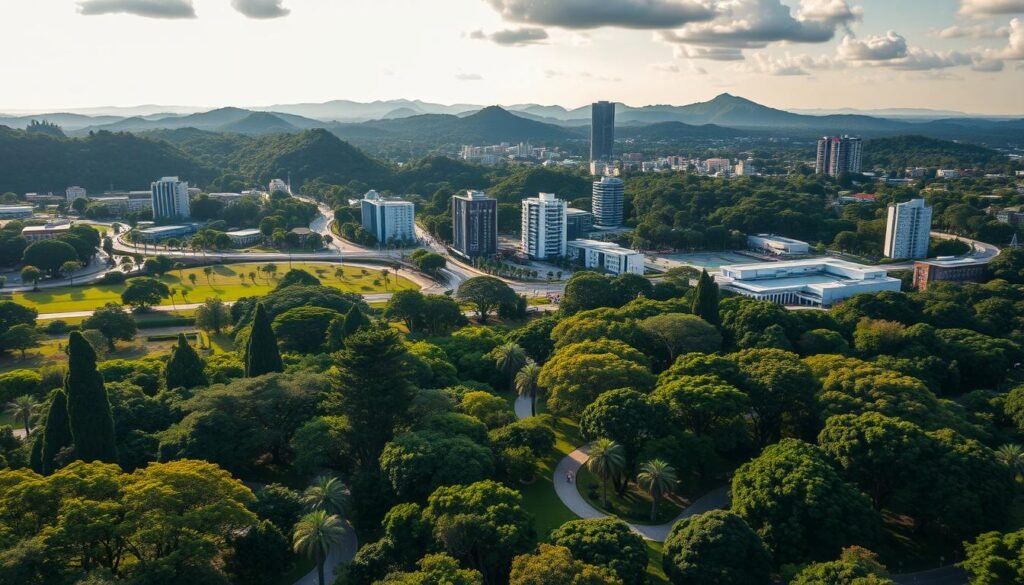
Imagine a city where every resident enjoys 52m² of green space—welcome to Curitiba. Ranked #1 in urban sustainability by RITLA, this eco-hub blends innovation with quality life. Its 70% recycling rate and 90% resident participation in waste-for-cash programs set a global benchmark.
The iconic Tubo stations revolutionized transit. These glass tube bus stops streamline the BRT system, used by 85% of locals. For nature lovers, the Botanical Garden’s crystal greenhouse showcases 350,000 species, while Santa Felicidade’s German breweries add Old-World charm.
Education thrives here. Free university programs attract expats, and cycling lanes with safety features encourage eco-commutes. Parks like Barigui double as stormwater buffers, proving sustainability isn’t just theory—it’s today’s reality.
| Initiative | Impact |
|---|---|
| Green Exchange Program | 70% recycling rate |
| BRT System | 85% resident usage |
| Urban Parks | 52m² green space per person |
“Curitiba didn’t wait for the future—it built it.”
From capoeira in Praça Santos Andrade to gourmet coffee in Batel, this city proves green living never sacrifices vibrancy. Pack your reusable bag—you’ll fit right in.
Porto Alegre: European Flair in South America
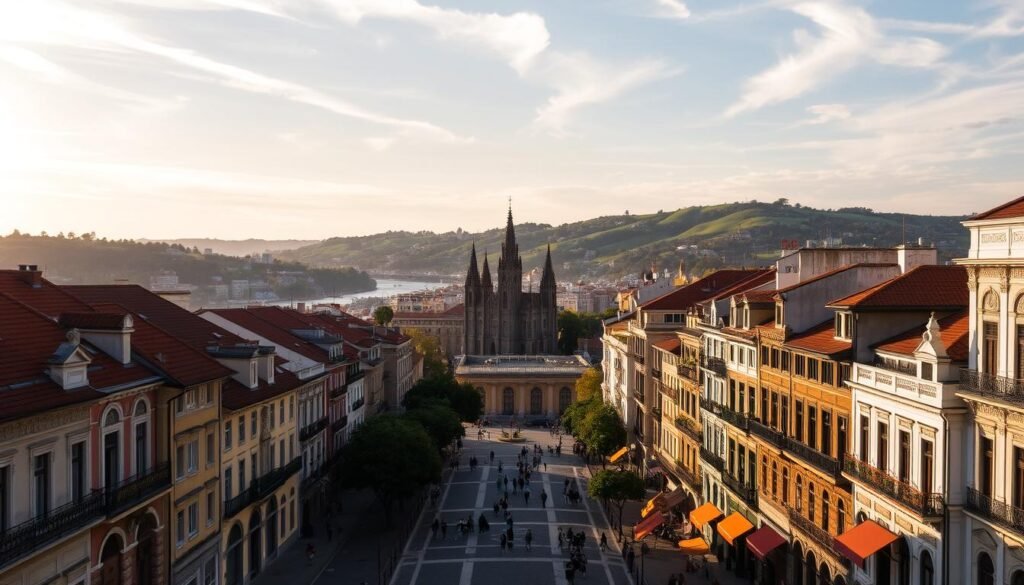
Octoberfest parades and Italian pasta shops reveal Porto Alegre’s deep European roots. This southern hub, home to 1.4 million people, blends German beer halls with Brazilian culture under a canopy of 1.5 million trees.
With a GDP of $77.7 billion, the state’s fourth-largest economy thrives. TecnoPUC’s startup incubators fuel tech jobs, while the Historic Public Market lures foodies with chimarrão tea and German sausages.
Don’t miss these highlights:
- Oktoberfest in São Leopoldo: Polka dances and stein contests
- Guaíba River’s waterfront: Sunset kayak tours
- Italian Immigration Museum: Stories of 19th-century settlers
“Porto Alegre feels like Europe with a Brazilian heartbeat—where strudel meets samba.”
UFRGS University adds intellectual energy, while Fundação Ibere Camargo’s modern art shakes up the scene. For a green escape, Jardim Botânico’s 39km² of parks offer quiet trails.
Participatory budgeting since 1989 keeps the population engaged. From World Social Forum debates to Mario Quintana’s poetry house, this city thrives on big ideas and warm culture.
Recife: The Brazilian Venice
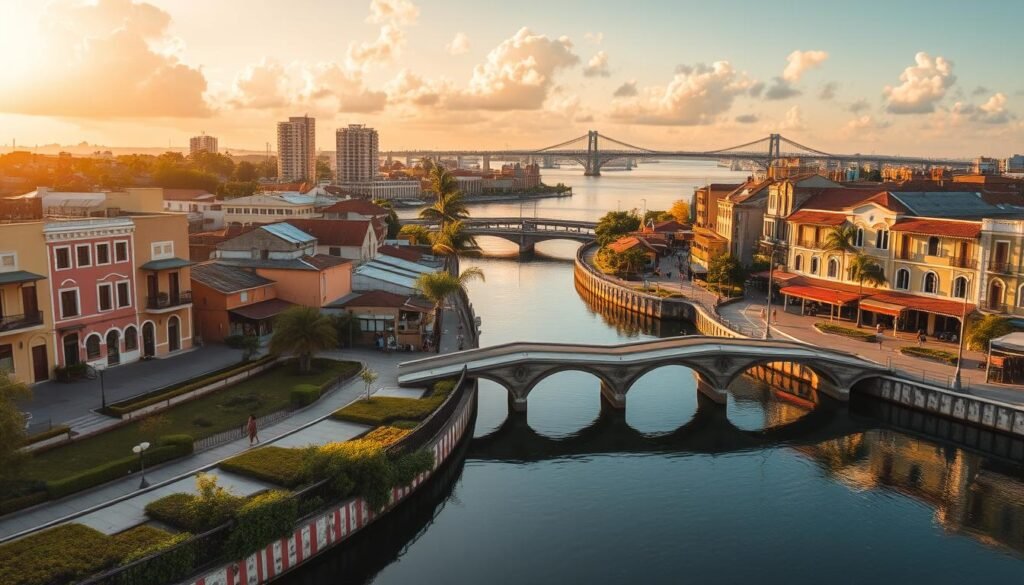
Crisscrossed by rivers and dotted with islands, Recife offers a unique maritime charm. Over 50 bridges connect its areas, where 16th-century Dutch fortifications overlook boat-filled waterways. The average cost living here is just $699/month—a steal for this coastal gem.
Hop on a boat tour along the Capibaribe River. You’ll glide past the Sculpture Park and the Old Grand Hotel, where history whispers from every brick. For beach lovers, Boa Viagem’s shark-safe shores dazzle with powder-white sand and turquoise waves.
Dive into local culture at Frevo dance workshops. This UNESCO-recognized art blends African rhythms with acrobatic flair. Nearby, Olinda’s Carnival puppets—including nods to global icons—parade through rainbow streets.
The community thrives in Porto Digital, a tech park hosting 90+ companies. Startups and creatives mingle in coworking spaces, fueling innovation. After work, join locals for tapioca crepes at Mercado da Boa Vista.
| Experience | Highlight |
|---|---|
| Boa Viagem Beach | Shark-safe swimming & orange umbrellas |
| Olinda Carnival | Giant puppet parades (Feb/Mar) |
| Porto Digital | 3,000+ tech jobs in historic buildings |
“Recife is where history dances with innovation—every canal tells a story.”
From Dutch-era Rua do Bom Jesus to modern art museums, this town balances past and future. Pack your sunscreen and curiosity—you’ll need both.
Fortaleza: Sun, Sand, and Affordable Living
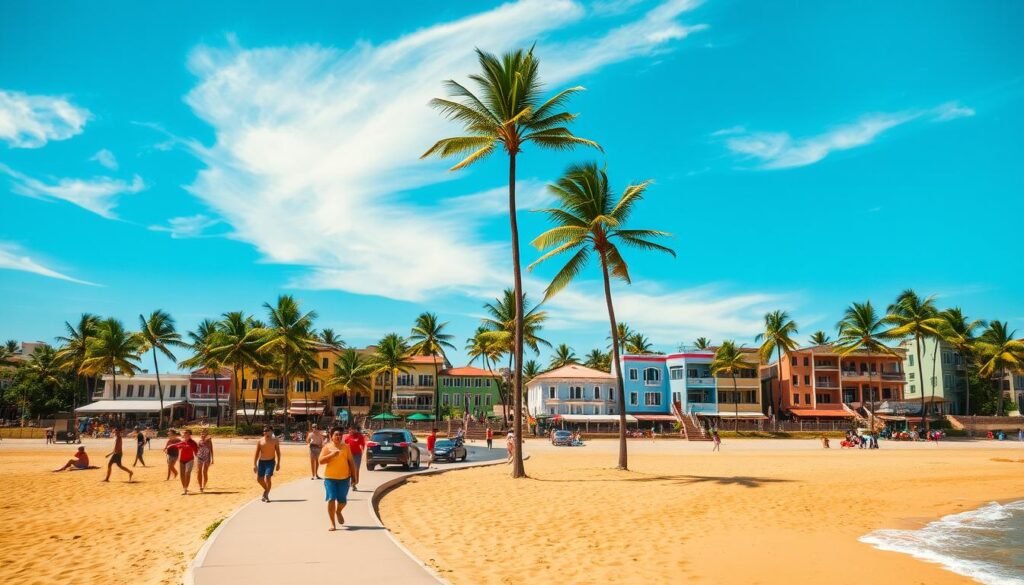
Golden dunes meet turquoise waves in Fortaleza, where coastal living comes at a fraction of U.S. prices. With an average monthly cost of $794, this northeastern hub offers affordable living without sacrificing tropical charm. Its 31km urban coastline ensures you’re never far from powdery beaches like Iracema, where kiteboarders ride the Atlantic breeze.
By day, take cachaça tasting tours or train at beachside kitesurfing schools. As sunset paints the sky, join residents at the Dragão do Mar cultural center for live music and art exhibits. The Meireles Beach artisan market buzzes with handmade crafts and fresh coconut water—just $1 a cup.
Fortaleza’s growth shines in renewable energy. Offshore wind projects create jobs, while coworking spaces like Elephant Coworking cater to digital nomads. Compare costs to other hotspots:
| Expense | Fortaleza | Miami |
|---|---|---|
| 1BR Apartment | $350 | $2,500 |
| Dinner Out | $12 | $50 |
“Fortaleza proves paradise doesn’t need a premium price tag—just an open mind and sunscreen.”
From samba nights on the boardwalk to quiet hammock naps, this city balances adventure with relaxation. Pack your flip-flops and ambition—today’s opportunities here are as vast as the ocean.
Vitória: A Hidden Gem for Expats
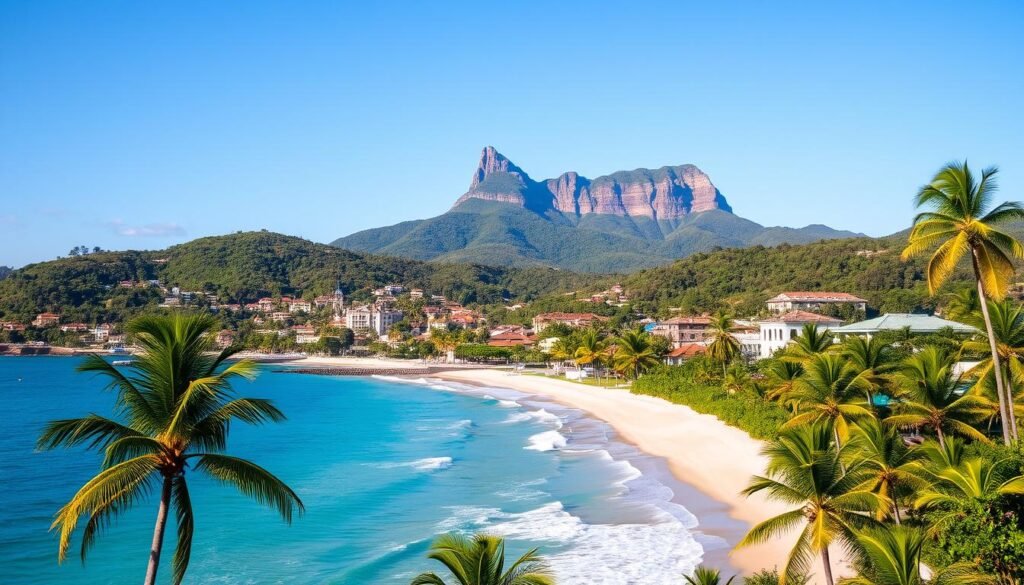
Tucked between mountains and sea, Vitória offers a rare blend of urban convenience and natural beauty. This capital of Espírito Santo charms with its 49 livability score—higher than many larger Brazilian metros. Clean air and drinkable tap water make daily life refreshingly simple.
The landscapes dazzle at every turn. Hike to Convento da Penha, a 16th-century hilltop monastery with panoramic bay views. Down at Camburi Beach, joggers trace 6km of golden sand as paragliders dot the skyline. Nearby mountains hide organic coffee farms where you can sip local roasts.
Professionals thrive in port logistics and tech. The Tubarão Complex handles 80M+ tons of cargo annually, while universities like UFES fuel research in renewable energy. Federal programs partner with startups, creating hybrid work opportunities.
Healthcare services impress with low diabetes rates and specialty clinics. UV index alerts help you enjoy the temperate climate safely. Compact and walkable, the city center blends colonial arches with modern coworking spaces.
- Safety first: Low crime rates and well-marked bike lanes
- Caffeine culture: Third-wave coffee shops in Praia do Canto
- Easy exploring: Historic sites within 20 minutes by bus
“Vitória proves you don’t need mega-city chaos for career growth—just ocean breezes and smart urban planning.”
From sunrise paddleboarding to after-work açai bowls, this harbor jewel delivers balanced living. Pack your laptop and hiking shoes—you’ll use both equally here.
Cost of Living in Brazil’s Top Cities
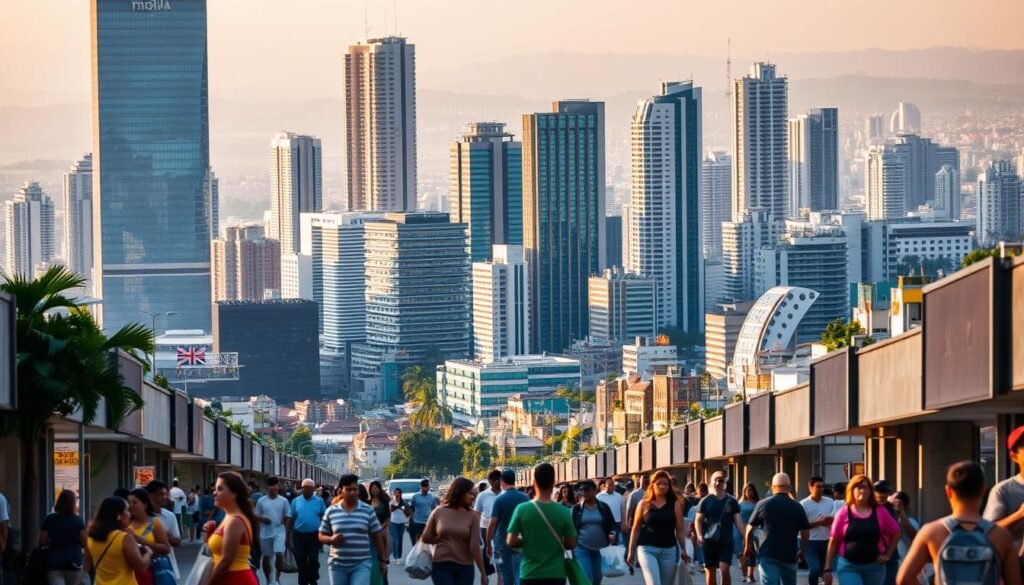
Budgeting for life in Brazil? Key cities vary wildly in rent, groceries, and transport prices. Whether you crave urban energy or coastal calm, understanding these differences helps you stretch your dollar further.
Urban Hubs: São Paulo vs. Rio de Janeiro
In São Paulo, a 1-bedroom apartment averages $560—nearly $100 pricier than Rio de Janeiro. But Rio’s utilities ($111/month) outpace São Paulo’s $73. Dining out? A mid-range meal for two costs $42 in São Paulo versus $31 in Rio.
Transport favors São Paulo:
- Monthly metro pass: $47 vs. Rio’s $53
- Taxi fares: $1.35/mile (SP) vs. $1.85 (Rio)
Coastal Bargains: Sun and Savings
For lower cost living, Natal shines with a $573/month average. Property taxes here are 30% cheaper than major metros. Local markets slash grocery bills—think $1.50 for milk or $0.80 for fresh mangoes.
Pro tips for coastal budgets:
- Use feiras livres (street markets) for 40% cheaper produce
- Ride-sharing apps cost 25% less outside tourist zones
- Public clinics offer free vaccinations
“Brazil rewards those who research—know your neighborhoods, and your wallet will thank you.”
| Expense | São Paulo | Rio de Janeiro | Natal |
|---|---|---|---|
| 1BR Rent | $560 | $473 | $350 |
| Utilities | $73 | $111 | $65 |
Healthcare and Education for Expats in Brazil
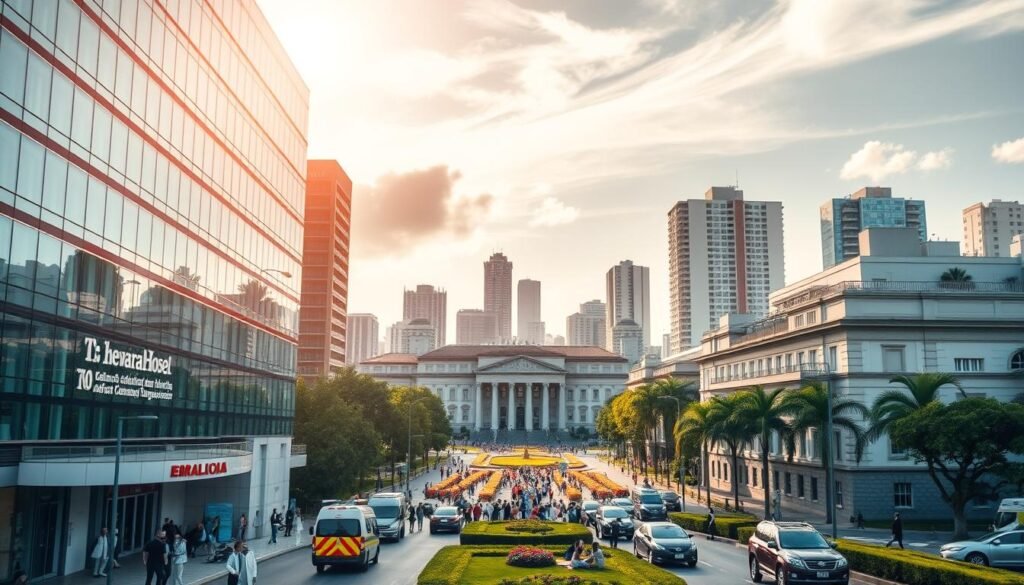
Navigating healthcare and education in Brazil is seamless with the right knowledge. The country’s 80.2% COVID vaccination rate reflects its strong public services. Whether you prioritize world-class hospitals or bilingual schools, Brazil delivers.
Healthcare: Public and Private Options
Brazil’s public system (SUS) offers free care, including dental and optometry. Expats can register with a CPF and migratory card for access. Wait times vary, so many opt for health insurance to use top facilities like Albert Einstein Hospital.
Key advantages of private care:
- Shorter wait times for specialists
- 24-hour pharmacies with affordable generics
- Dental tourism savings—procedures cost 60% less than in the U.S.
Education: From Classrooms to Universities
Public schools teach in Portuguese, while private options include International Baccalaureate programs. A 25:1 student-teacher ratio ensures attention. For higher education, universities like USP rank globally, with tuition far below U.S. rates.
Expat families often choose:
- British or American-curriculum schools in São Paulo/Rio
- Tutors for Portuguese immersion (avg. $15/hour)
- Vaccination schedules aligned with Brazil’s health standards
“Brazil’s healthcare and schools adapt to expat needs—combining quality with cultural immersion.”
| Service | Public | Private |
|---|---|---|
| Doctor Visit | Free | $50–$100 |
| International School | N/A | $8,000–$20,000/year |
From SUS clinics to STEM-focused universities, Brazil supports expat wellness and growth. Pack your medical records and curiosity—you’re covered.
Safety Tips for Living in Brazil
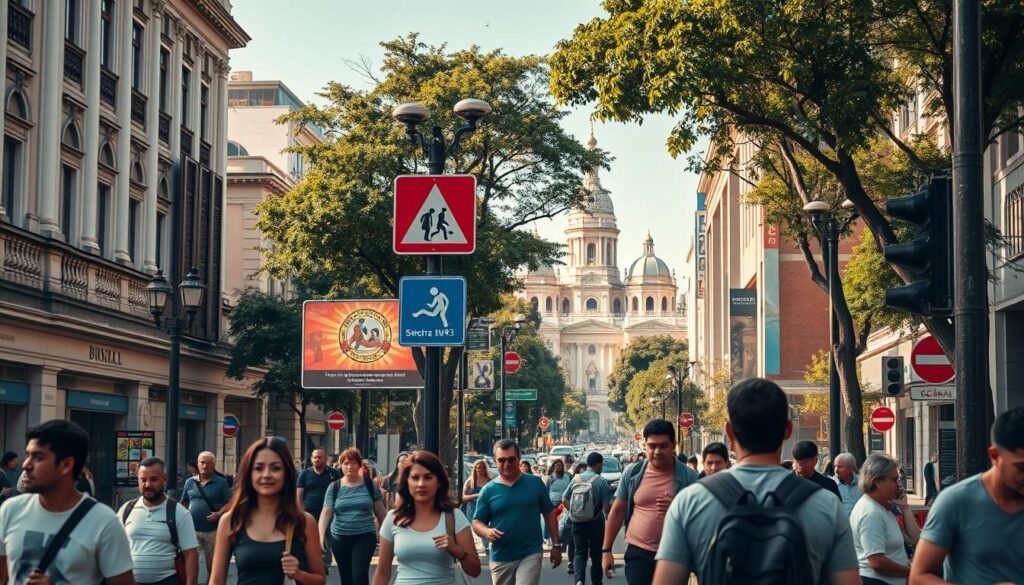
Your experience in Brazil improves with practical safety tips. While 56% of expats rate security as a concern, smart habits keep you protected. LGBTQ+ travelers should research local attitudes—some neighborhoods offer more inclusive community spaces than others.
Download neighborhood watch apps like Prey or Onde Tem Tiroteio. These provide real-time alerts about nearby incidents. For taxis, always verify drivers through the 99 app before entering.
Memorize emergency numbers:
- 190 for police
- 192 for medical
- 193 for fire
“Brazil rewards cautious travelers—keep valuables in cross-body bags and avoid phone use on busy streets.”
At beaches, leave jewelry in hotel safes and swim before 5 PM. Shark warnings are common in Recife—heed red flags. For access to help, program local contacts into your phone.
Today’s tech helps too. Waterproof fanny packs secure items during water activities. Uber often proves safer than street-hailed cabs after dark. With these steps, you’ll enjoy Brazil’s energy while minimizing risks.
Navigating Brazil’s Visa Requirements
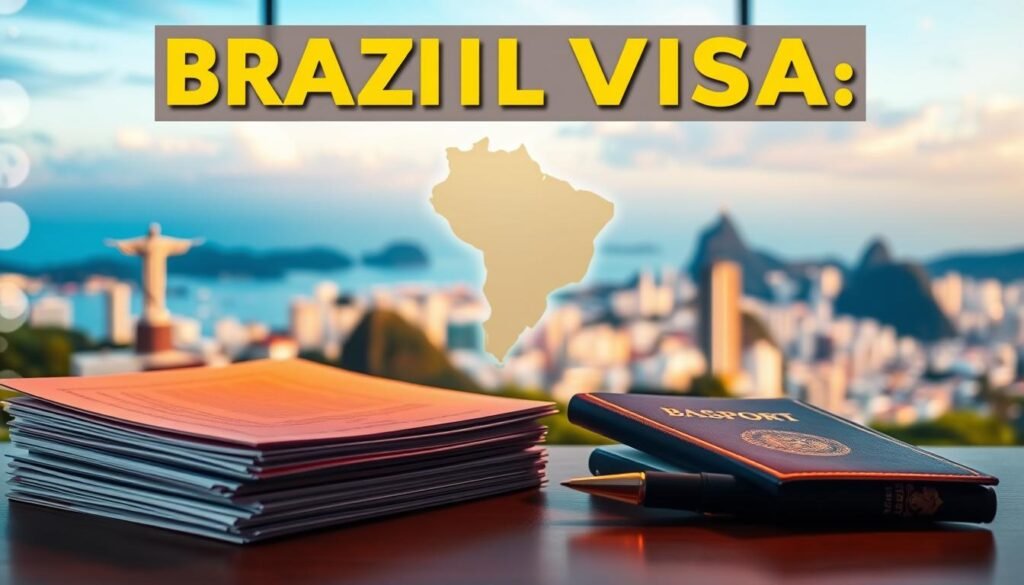
Brazil welcomes global talent with structured visa pathways for every lifestyle. Whether you’re a remote professional or planning golden years by the beach, understanding visa requirements ensures a smooth transition.
Income-Based Visas: Digital Nomads and Retirees
The digital nomad visa demands proof of $1,500/month income—ideal for freelancers or remote workers. Retirees need $2,000/month, verified through pensions or investments. Both require:
- Apostilled birth certificates (processed in your home region)
- FBI background checks (allow 6-8 weeks)
Investment and Work Options
Investors can secure residency by purchasing BRL 1M+ in real estate or funding Brazilian businesses. For traditional work visas, employers must petition Brazil’s Ministry of Labor first.
“Start visa applications 4-6 months early—document authentication often takes longer than expected.”
| Visa Type | Key Requirement |
|---|---|
| Freelancer | Register with Brazil’s tax authority (CPF) |
| Student | Enrollment proof from accredited institutions |
Consulate appointments book fast—schedule yours online the moment your documents are ready. Bring originals plus Portuguese translations for a seamless review.
Conclusion: Finding Your Perfect Brazilian City
Your ideal destination blends climate, culture, and career opportunities. Tropical coastlines suit sun-seekers, while temperate highlands attract those preferring milder weather. Each region delivers distinct flavors of quality life.
Learning Portuguese unlocks deeper connections—start with apps before arrival. Cultural adaptation thrives through local festivals and neighborhood friendships. Most expats feel at home within six months.
Prioritize safety research and healthcare access when choosing places live. A relocation checklist should include visa paperwork, vaccination records, and financial planning. With preparation, Brazil’s vibrant world becomes your everyday reality.
